jump-dev
-
JuMP-dev 2026
jump-dev ·
JuMP-dev 2026 will be held Sunday, May 31 and Monday June 1, 2026 in Edinburgh, Scotland.
This is the weekend prior to SIAM OP26, which will be held June 2-5, 2026 in Edinburgh, Scotland.
JuMP-dev will be co-located with the 2026 HiGHS Workshop.
Outline
The purpose of JuMP-dev is to...
-
JuMP-dev 2025
jump-dev ·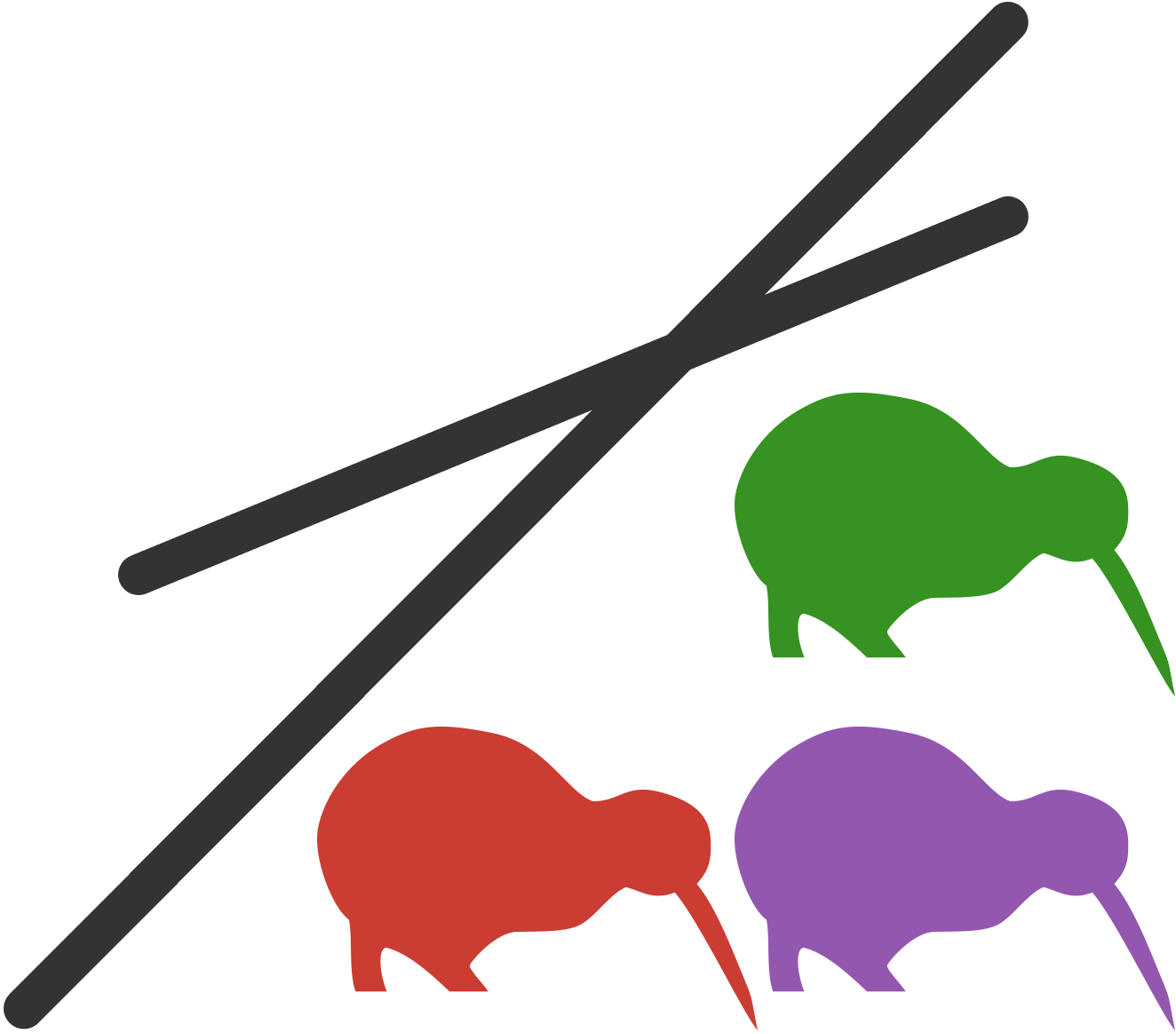
JuMP-dev 2025 was held November 17–20, 2025 in Auckland, New Zealand.
The workshop was organized with help from the Operations Research Society of New Zealand.
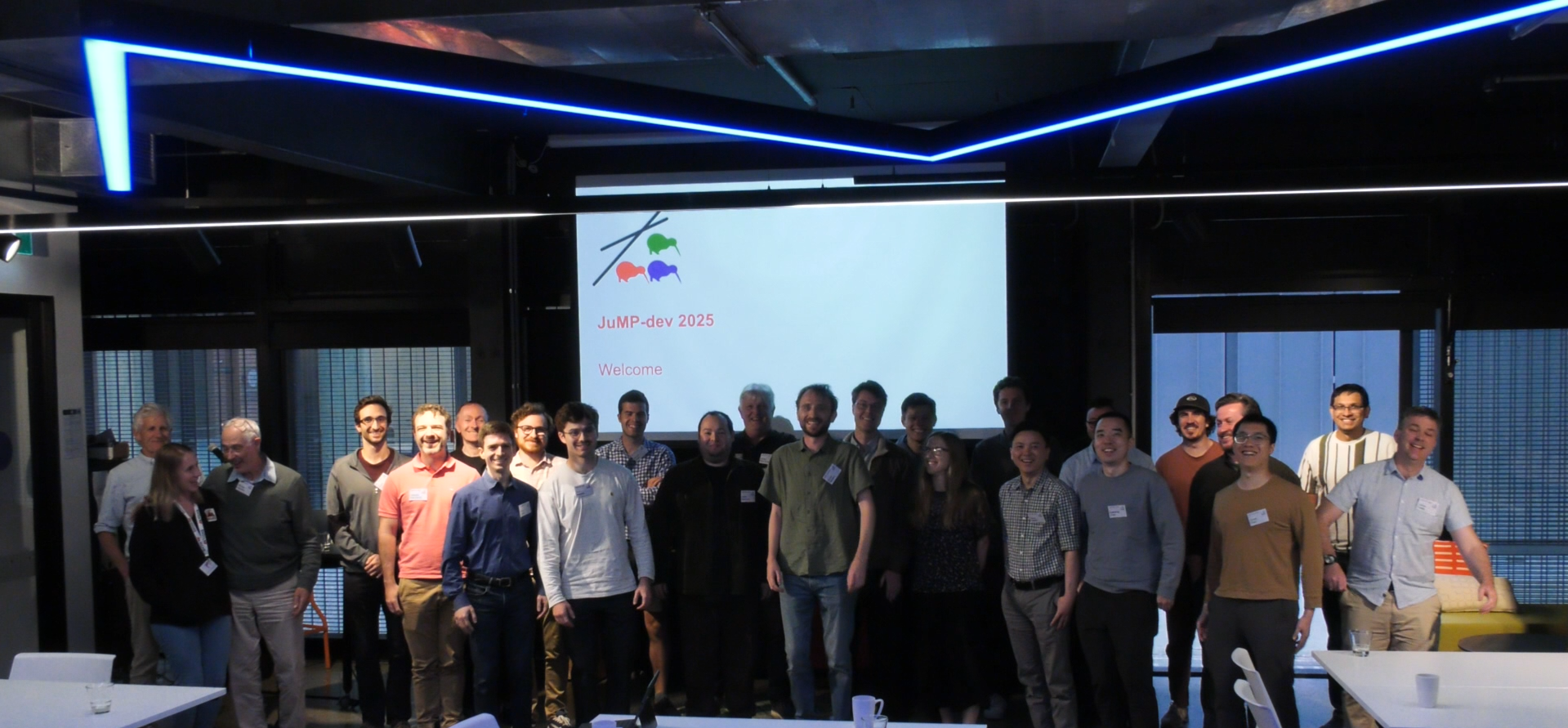
See also the 2025 JuMP-dev prize.
Outline
The purpose of JuMP-dev is to bring...
-
JuMP-dev 2024
jump-dev ·JuMP-dev 2024 was held 19-21 July, 2024 in Montréal, Canada. This was immediately prior to ISMP 2024.
The workshop was organized with the help of the GERAD research center.
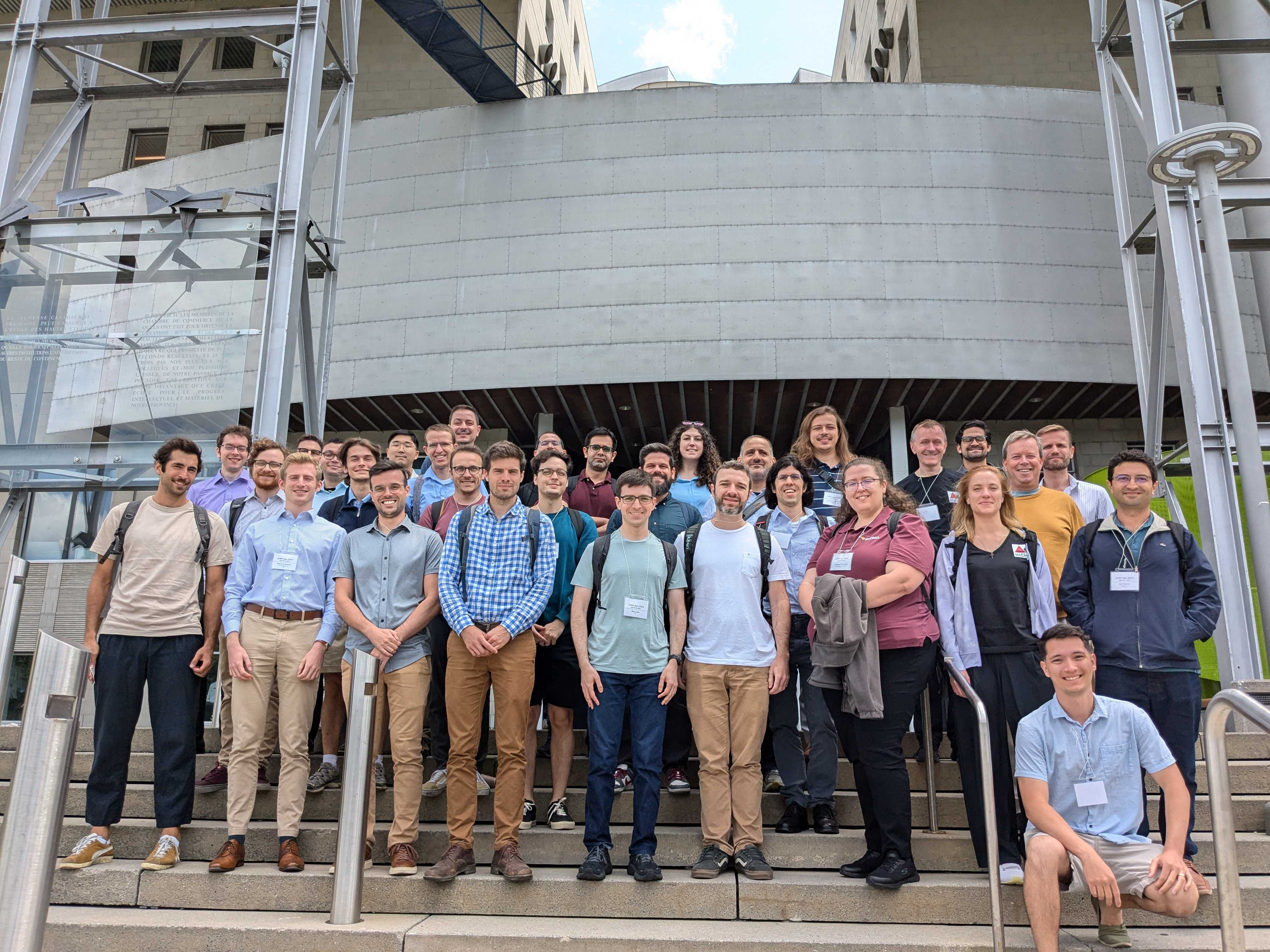
See also the best presentation awards.
Outline
The purpose of JuMP-dev is to bring together students,...
-
JuMP-dev 2023
jump-dev ·JuMP-dev 2023 was held in person, 27-29 July, 2023 in Cambridge, Massachusetts. It was co-located with JuliaCon 2023.
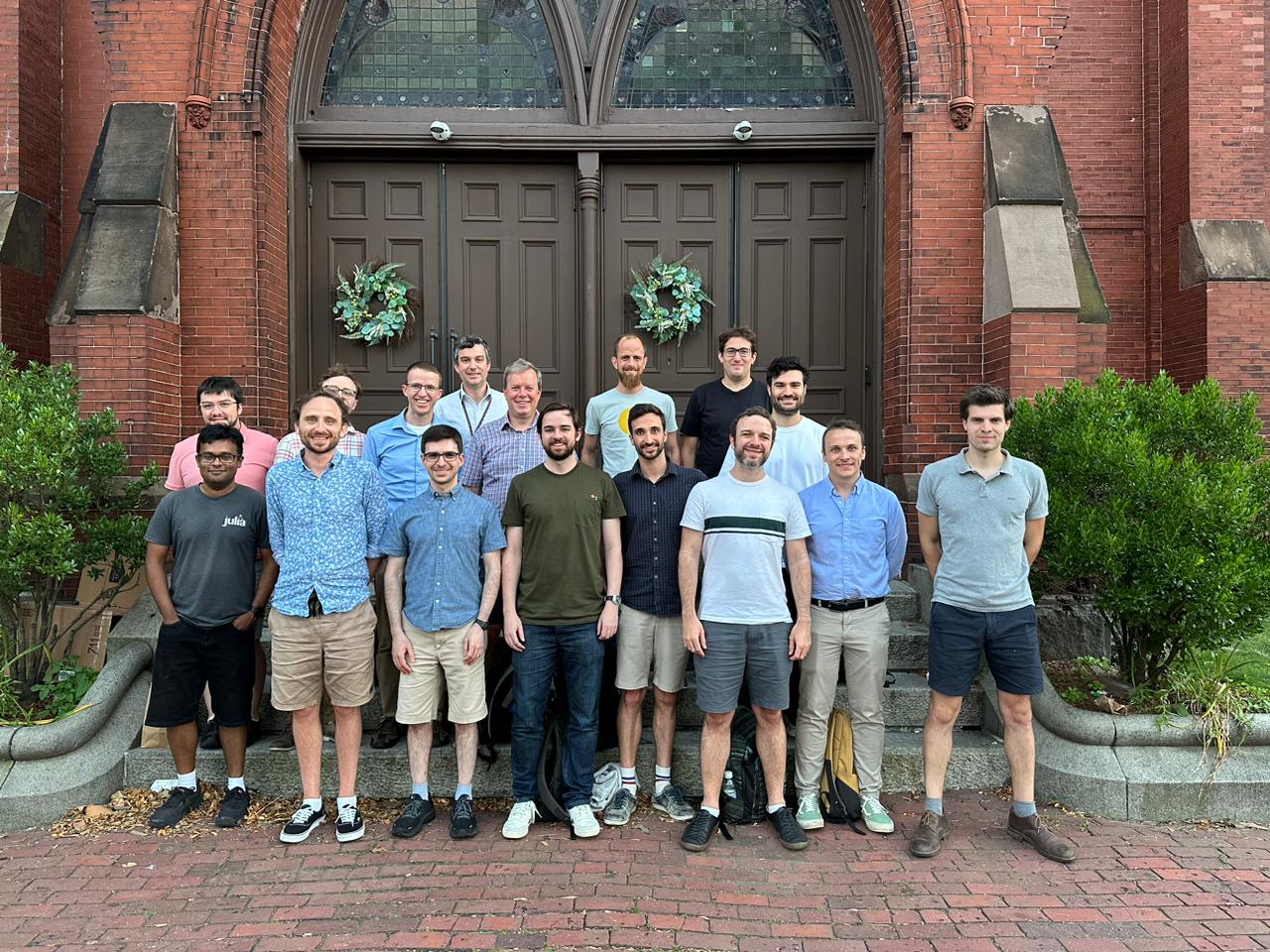
Outline
The purpose of JuMP-dev is to bring together students, researchers, and practitioners with interests in the methodological, algorithmic, and software aspects of JuMP and related packages....
-
JuMP-dev 2022
jump-dev ·We are pleased to announce that JuMP-dev 2022 will be co-located with JuliaCon 2022!
This year JuliaCon is virtual, and will be held 27-29 July, 2022.
Outline
The purpose of JuMP-dev is to bring together students, researchers, and practitioners with interests in the methodological, algorithmic, and software aspects of JuMP and related packages. In particular, we invite...
-
JuMP-dev 2021
jump-dev ·We are pleased to announce that JuMP-dev 2021 will be co-located with JuliaCon 2021!
This year JuliaCon is virtual, and will be held 28-30 July, 2021.
Outline
The purpose of JuMP-dev is to bring together students, researchers, and practitioners with interests in the software aspects of JuMP and related packages. In particular, we invite new contributors and...
-
Mathieu Tanneau | Design and implementation of the interior-point solver Tulip
jump-dev ·Mathieu Tanneau, a Ph.D. student at Polytechnique Montréal, gave his talk that was accepted for JuMP-dev 2020 on the design and implementation of the interior-point solver Tulip.jl during August 2020’s JuMP monthly developer call.
The talk material is available on his GitHub.
Abstract
Tulip.jl is...
-
Guillaume Marques | Design and features of Coluna.jl
jump-dev ·Guillaume Marques, a Ph.D. student at the Université de Bordeaux, gave his talk that was accepted for JuMP-dev 2020 on the design and features of the Coluna.jl package during June 2020’s JuMP monthly developer call.
Abstract
Coluna.jl is a branch-and-cut-and-price framework written in Julia. The user introduces...
-
Cancelled: JuMP-dev 2020
jump-dev ·First, we hope that everyone is safe in these uncertain times. Our first priority will always be the health and well-being of the JuMP community. Therefore, we regret to announce that we have decided to cancel JuMP-dev 2020.
Even though there are conceivable scenarios in which travel restrictions are lifted in Europe before June 15th, we feel that there...
-
JuMP-dev 2020
jump-dev ·June 15-17, 2020, Louvain-la-Neuve, Belgium.
This workshop is the fourth JuMP-dev workshop after the first, second, and third JuMP-dev workshops.
The purpose of the workshop is to bring together students, researchers, and practitioners with interests in the software aspects of JuMP and related packages. The workshop is open for anybody to...
-
JuMP-dev 2020: Save the date!
jump-dev ·We are pleased to announce that the 4th annual JuMP-dev workshop will be held June 15-17 2020 in Louvain-la-Neuve, Belgium, in conjunction with UCLouvain.
Further details, including a call for speakers, will be announced shortly.
For information on the previous JuMP-dev workshops, see: 2019, 2018, 2017.
-
The Third Annual JuMP-dev Workshop
jump-dev ·March 12-14, 2019, Santiago, Chile.
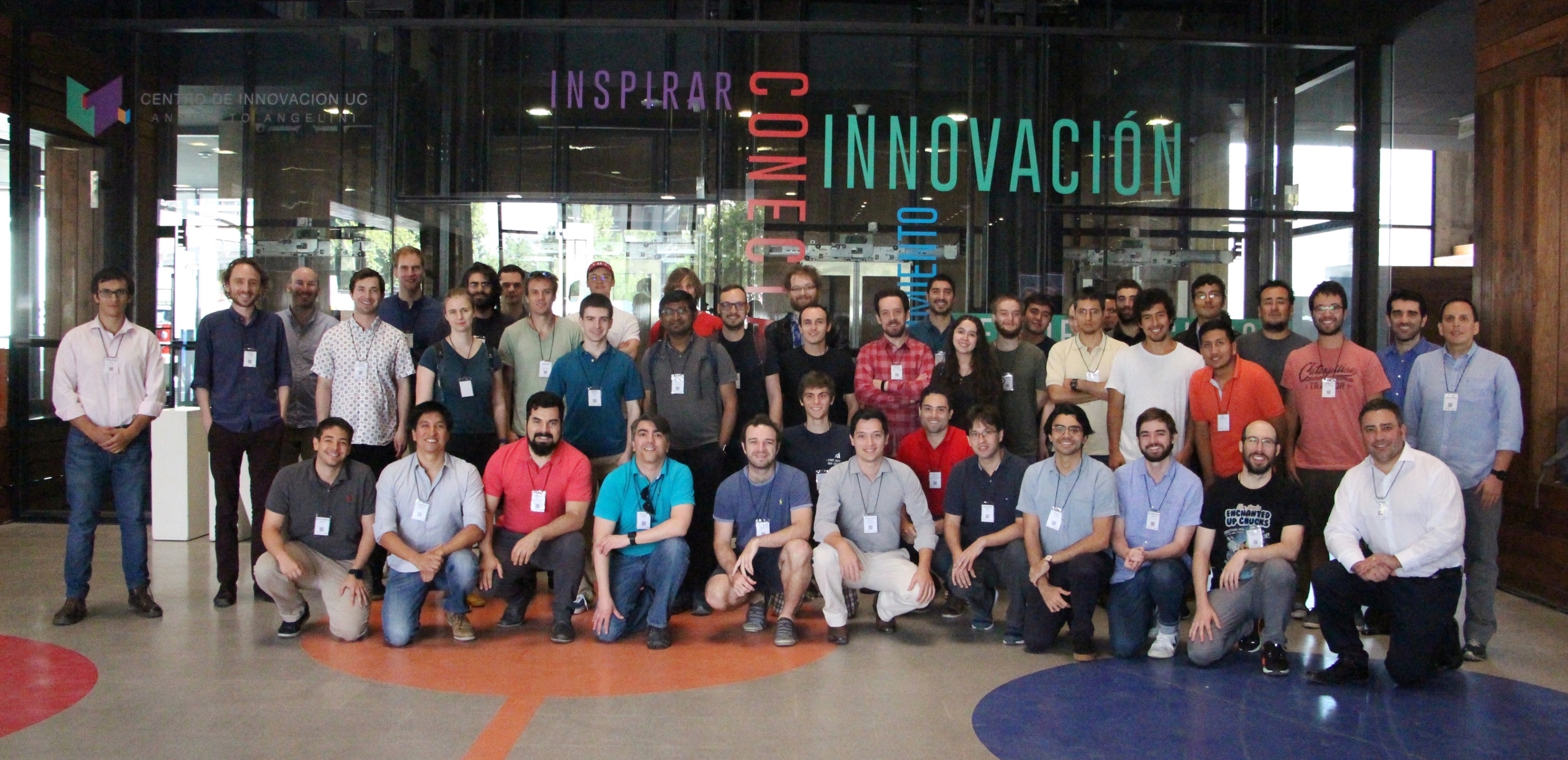
This workshop is the third JuMP-dev workshop after the first and second JuMP-dev workshops.
GSoC News: JuMP will be participating in the 2019 Google Summer of Code under the NumFOCUS umbrella. For more information see JuMP’s project ideas...
-
The Second Annual JuMP-dev Workshop
jump-dev ·June 27-29, 2018, at the Institut de Mathématiques de Bordeaux, University of Bordeaux.
The workshop was sponsored by the MIT Sloan school of management, IDEX Bordeaux, and Changhyun Kwon.
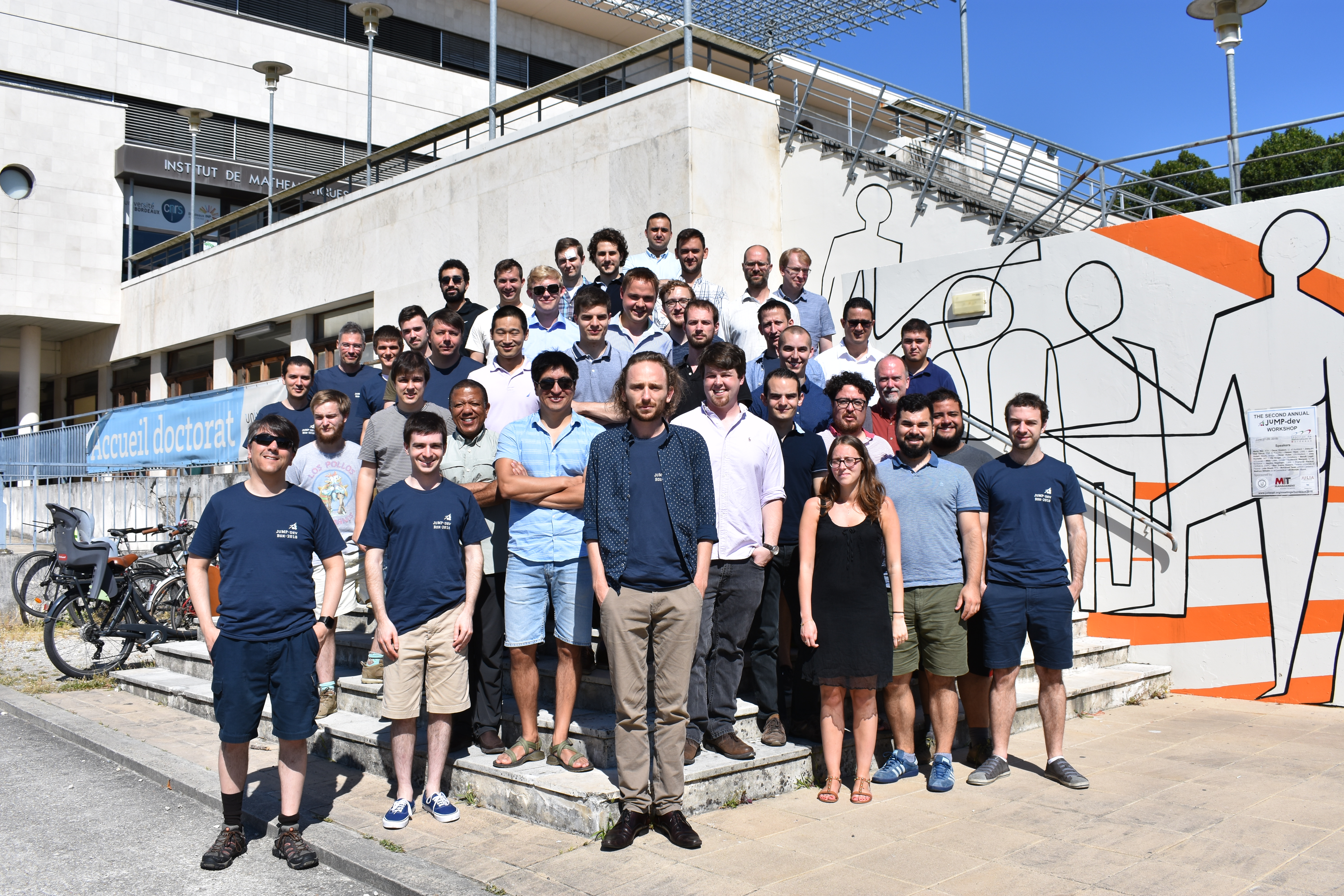
Purpose
This workshop is a follow-up to the first annual JuMP-dev workshop held in June 2017 at MIT. The purpose of...
-
JuMP Developers Meetup/Workshop
jump-dev ·June 12-16, 2017, at Sloan School of Business, Massachusetts Institute of Technology.
The workshop was sponsored by the MIT Sloan Latin America Office.
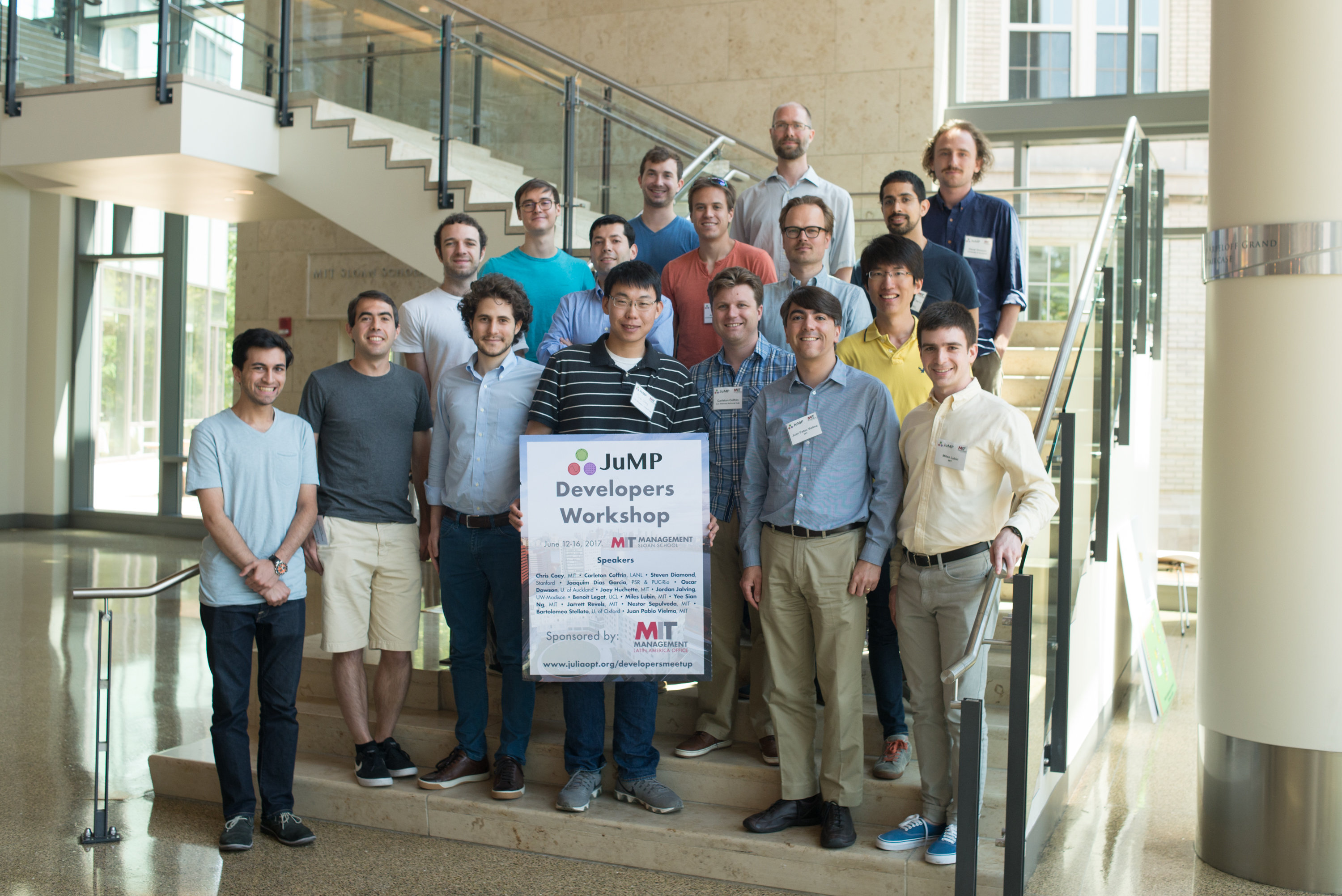
Purpose
The workshop is designed to serve as an opportunity for developers of mathematical optimization software within the JuMP “stack” (i.e., solvers, solver interfaces, MathProgBase, JuMP, and JuMP extensions) to...
conferences
-
JuMP talks at the 2019 INFORMS Annual Meeting
conferences ·Following is a list of some JuMP related sessions and talks at the 2019 INFORMS Annual Meeting:
- Dedicated JuMP sessions:
- SB33. JuMP for Stochastic Optimization, CC- Room 602, October 20, 2019, 11:00 AM:
- Dedicated JuMP sessions:
-
JuMP talks at ROADEF 2018
conferences ·Following is a list of some JuMP related sessions and talks at ROADEF 2018:
- Dedicated JuMP session:
milestones
-
JuMP: the year in review (2023)
milestones ·At the end of last year, I gave a talk at the 55th Operations Research Society of New Zealand annual conference (slides). It proved to be a good excuse to summarize the progress we made in JuMP over the past year, and, since we didn’t record the talks, the President of ORSNZ, Andrea Raith, suggested a blog post...
-
Celebrating the first 1000 stars on GitHub
milestones ·JuMP just received its 1000th star on GitHub! We will use this milestone to recap JuMP’s growth and other important milestones since its beginnings as an experimental project in 2012.
While tracking the success of an open-source project is known to be a hard problem, we have a few metrics available to us. The number of citations of the two...
releases
-
JuMP 1.15.0 is released
releases ·We are happy to announce the release of JuMP 1.15.0.
This is a very large minor release because it adds an entirely new data structure and API path for working with nonlinear programs.
The previous nonlinear interface remains unchanged and is documented at Nonlinear Modeling (Legacy). The new interface is a treated as a non-breaking feature addition and is...
-
JuMP 1.0.0 is released
releases ·We are happy to announce the release of JuMP 1.0!
Nearly 10 years in the making, the release of JuMP 1.0 represents a major milestone in the history of JuMP. It also represents a stable platform from which we can continue to build new and exciting features for a long time into the future.
In this post we explain what...
-
JuMP 0.23 is released
releases ·We are happy to announce the release of JuMP v0.23.
This is an important release for two reasons.
First, it serves as a release candidate for JuMP v1.0. Our criteria for tagging an official JuMP 1.0 release are:
- there have been no bugs requiring a breaking change detected in JuMP v0.23 for at least one week
- all commonly used...
-
An update on constraint programming in JuMP
releases ·JuMP and MathOptInterface are oriented towards traditional mathematical optimization, encompassing problem classes such as mixed-integer linear programs and conic optimization. However, the MathOptInterface API is amenable to other kinds of formalism, including constraint programming.
In contrast to linear or conic programs, constraint programs typically have no objective function, but a much wider variety of constraints that are supported. The...
-
JuMP 0.21.7 is released
releases ·We are happy to announce the release of JuMP 0.21.7. This should be a non-breaking release, please let us know if this isn’t the case by opening a GitHub issue or joining the developer chatroom.
A key feature of interest is that we have continued to significantly revise our documentation. The Nonlinear Modeling section is now much...
-
JuMP 0.21.6 is released
releases ·We are happy to announce the release of JuMP 0.21.6. This should be a non-breaking release, please let us know if this isn’t the case by opening a GitHub issue or joining the developer chatroom.
A key feature of interest is that we have significantly revised our documentation, including examples that are now built in the documentation....
-
JuMP 0.21.5 is released
releases ·We are happy to announce the joint release of JuMP 0.21.5 and MathOptInterface 0.9.17! These releases are a mix of new features and some much needed performance optimizations. This should be a non-breaking release, please let us know if this isn’t the case by opening a GitHub issue or joining the Developer chatroom. We did have a couple...
-
JuMP 0.21 is released
releases ·We are happy to announce the release of JuMP 0.21! Since the 0.20 release, 32 pull requests have been merged and 34 issues closed (listed here). The release is packed with new features and contains a couple of breaking changes. We’ll give only a quick summary of the changes here. See the release notes for more details. Here’s...
announcements
-
NumFOCUS signs agreement with NLR to maintain and support JuMP
announcements ·The JuMP Steering Committee is pleased to announce that we, through NumFOCUS, have signed an agreement with National Laboratory of the Rockies (NLR) to maintain and support JuMP.
The objective of this project is to significantly improve the computational performance and code quality of NLR’s open-source project PowerSimulations.jl and the JuMP ecosystem.
The agreement runs until October...
-
JuMP and HiGHS join forces to improve open energy modeling
announcements ·The JuMP Steering Committee is pleased to announce that we, through NumFOCUS, have received a large grant from the Breakthrough Energy Foundation to improve the performance of JuMP and HiGHS on open energy models. This grant is an extension of our previous work on open energy modeling.
The agreement runs for one year, and the...
-
JuMP and HiGHS join forces to improve open energy modeling
announcements, open-energy-modeling ·The JuMP Steering Committee is pleased to announce that we, through NumFOCUS, have received a large grant from the Breakthrough Energy Foundation to improve the performance of JuMP and HiGHS on open energy models.
In our recent post, Steering Committee changes, we announced that Juan Pablo was stepping and Julian Hall (the lead developer of...
-
NumFOCUS signs agreement with LANL to develop and support an AI toolbox for JuMP
announcements ·The JuMP Steering Committee is pleased to announce that we, through NumFOCUS, have signed an agreement with Los Alamos National Laboratory (LANL) to develop an AI toolbox for JuMP.
The main deliverable is a new package, MathOptAI.jl, which is a package for embedding trained machine learning predictors into a JuMP model. MathOptAI is inspired by packages...
-
Steering Committee changes
announcements ·Recently, Juan Pablo Vielma notified the JuMP Steering Committee that he is stepping down (effective immediately) from his role on the Steering Committee.
Juan Pablo was instrumental in the success of JuMP, supervising Miles Lubin and Joey Huchette as Ph.D. students at MIT. Juan Pablo helped organize the first three iterations of the JuMP-dev workshop: JuMP-dev 2017 at...
-
PSR sponsors maintenance and support of JuMP
announcements ·The JuMP Steering Committee is pleased to announce that we, through NumFOCUS, have signed an agreement with PSR to provide maintenance and support for JuMP and the surrounding ecosystem.
PSR is a global provider of consulting services, computational modeling and energy innovation; and actively contributes to research and development of optimization and data analytics solutions.
The agreement...
-
RelationalAI sponsors constraint programming support in JuMP
announcements ·The JuMP Steering Committee is pleased to announce that we, through NumFOCUS, have signed an agreement with RelationalAI to improve constraint programming support in JuMP.
Constraint programming is a goal of the post-1.0 JuMP roadmap, and we gave an update on our progress last year.
The three main goals of this new work are to...
-
NumFOCUS small development grant: adding complex number support to JuMP
announcements ·The JuMP Steering Committee is pleased to announce that we have received a small development grant from NumFOCUS to add complex number support to JuMP.
Currently, JuMP and MathOptInterface are limited to formulating optimization problems with real-valued decision variables. However, complex numbers appear in a variety of industrial optimization problems. One of the most important of these...
-
NumFOCUS signs agreement with LANL to improve nonlinear support in JuMP
announcements ·The JuMP Steering Committee is pleased to announce that we, through NumFOCUS, have signed an agreement with Los Alamos National Laboratory (LANL) to improve nonlinear support in JuMP.
The agreement runs until September 2023.
At a high-level, the agreement seeks to improve nonlinear support in JuMP on two key fronts:
- improving the automatic differentiation performance in...
-
NumFOCUS signs agreement with MIT to provide ongoing maintenance and support
announcements ·The JuMP Steering Committee is pleased to announce that we, through NumFOCUS, have signed an agreement with MIT to provide ongoing maintenance and support of JuMP as part of the National Science Foundation award OAC1835443. The agreement may be renewed on an annual basis through December 2023.
At a high-level, the agreement covers work that is...
-
Formalizing a governance structure
announcements ·Recently, JuMP turned eight years old. (The first commit for “Julp” was made on 10 October 2012!) It has come a long way since it’s creation as a side-project of two graduate students at MIT, and as we approach a 1.0 release, we thought it was time to formalize our governance structure.
You can find the resulting document under...
solvers
-
HiGHS.jl 0.1 released
solvers ·We are happy to announce the initial
v0.1release of HiGHS.jl, a wrapper for HiGHS.HiGHS is a new high-performance open-source linear programming solver being developed by Julian Hall and colleagues at the University of Edinburgh, Scotland.
The GitHub README has information on how to install and use HiGHS.jl with JuMP.
While HiGHS is ready...
tutorials
-
Testing Julia packages
tutorials ·This post documents how the JuMP developers structure tests in Julia packages. We use this pattern extensively across the jump-dev package ecosystem (although only a few packages currently use ParallelTestRunner.jl; it’s a work in progress).
Background
Julia ships with the
Teststandard library, which provides macros such as@test,@testset, and... -
Building and testing JLLs in GitHub actions
tutorials ·The purpose of this blog post is to document a workflow that I have found useful during the development and maintenance of solver wrappers. By the time you read this, it might be out of date, but I hope it’s a helpful prod in the right direction.
Background
Many JuMP solvers are implemented in compiled languages such as C...
-
Finding multiple feasible solutions
tutorials ·This tutorial demonstrates how to formulate and solve a combinatorial problem with multiple feasible solutions. In fact, we will see how to find all feasible solutions to our problem. We will also see how to enforce an “all-different” constraint on a set of integer variables.
This post is in the same form as tutorials in the JuMP documentation but...
developers-call
-
JuMP nonlinear developers call: The JuliaSmoothOptimizers ecosystem
developers-call ·In February’s edition of the JuMP nonlinear developers call, Tangi Migot and Alexis Amontoison discussed the JuliaSmoothOptimizers ecosystem.
The notebooks and project files used in the talk are available as a downloadable .zip file.
Abstract
In this talk, we will give an overview...
general
-
JuMP, GAMS, and the IJKLM model
general ·A recent blog post by GAMS demonstrated a significant performance difference between JuMP and GAMS on a model they call IJKLM. We respond to this blog post by explaining the difference in performance and presenting an alternative JuMP implementation with asymptotically better performance. We also identify that differences in the input data format—not anything intrinsic to the respective libraries—explain...
jump-dev-prize
-
JuMP-dev prize 2025
jump-dev-prize ·Last year at JuMP-dev 2024 we started what we hope will be a tradition of giving the JuMP-dev prize. This year we did a little more advance planning and purchased two children’s jump ropes, which will be the physical manifestation of this year’s prize.
The prize committee was the set of core developers, and we decided on two...
-
JuMP-dev prize 2024
jump-dev-prize ·The JuMP-dev 2024 workshop introduced a new best presentation prize.
The prize was awarded to two presentations:
- Truls Flatberg and SINTEF for the talk Applied optimization with JuMP at SINTEF. The presentation highlighted long-term initiatives to use JuMP for applied projects and to push the culture of the organization towards open-source solutions. We also recognize SINTEF’s ongoing...
open-energy-modeling
-
An Open Energy Modeling update
open-energy-modeling ·We’re now ten months into our Open Energy Modeling project. If you missed them, you can read our November update and our January update.
Welcome, Mark
In May we welcomed Dr. Mark Turner to the project. Mark has a Ph.D. from TU Berlin where he worked on SCIP. Mark’s focus is on improving the performance...
-
An Open Energy Modeling update
open-energy-modeling ·We’re now four months into our Open Energy Modeling project. This blog post is a summary of some of things that we have been up to.
Community engagement
We have increased engagement between the developers of JuMP and HiGHS and the open energy modeling community. We have done this by holding fortnightly stakeholder calls, publishing bi-monthly updates on...
-
An Open Energy Modeling update
open-energy-modeling ·We’re now two months into our Open Energy Modeling project. Here’s a summary of some of things that we have been up to.
If you are an open energy modeller who uses JuMP or HiGHS and you want to stay in touch with our progress or provide us with feedback and examples, write to
jump-highs-energy-models@googlegroups.com. We’d love... -
Open Energy Modeling at JuMP-dev
open-energy-modeling ·In July 2024, we held JuMP-dev 2024, the seventh edition of our annual developer workshop. As part of the workshop, we sought talks from a number of groups who use JuMP to build open energy models.
Motivated by our recently announced Open Energy Modeling project, I started writing this report as a summary of my notes from watching...
-
JuMP and HiGHS join forces to improve open energy modeling
announcements, open-energy-modeling ·The JuMP Steering Committee is pleased to announce that we, through NumFOCUS, have received a large grant from the Breakthrough Energy Foundation to improve the performance of JuMP and HiGHS on open energy models.
In our recent post, Steering Committee changes, we announced that Juan Pablo was stepping and Julian Hall (the lead developer of...